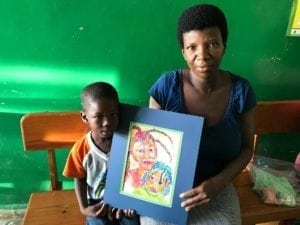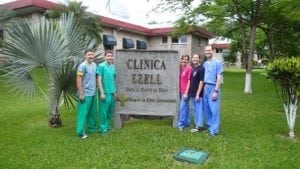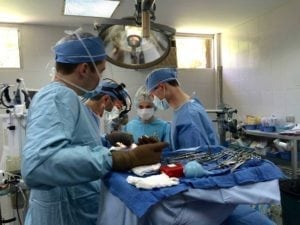It’s a snowy January morning at McGhee Tyson Airport. Passengers scramble through the terminal in search of their gates, ignoring the snow resting softly on the tarmac. That is, everyone except Dr. Abigail Blackmon. Gliding back in forth in a rocking chair in the corridor, she plays a game on her cellphone, glancing up every so often to admire the snow outside.
To some there is nothing unique about this situation. Just a woman lost in concentration on her phone, waiting for her flight to begin boarding. And while this is indeed just another normal trip for the Powell-based pediatrician, it is far from normal to others, for she is about to head to a place much different than Knoxville, a place plagued by natural disasters where roughly 62 percent of the population fall below the international poverty line. It’s a place lacking critical access to medical care. And it’s a place she’s going for the 30th time to simply help.
Blackmon is heading to Haiti, the first of four eight-day trips she will make this year.
Beginning the Mission
Blackmon has been a pediatrician in eastern Tennessee for the last two decades. By day she runs her practice with her husband, Greg, and by night she puts on her mom cap to six girls, ages 12 to 23. “Ending up in pediatrics more than anything was kind of a divine intervention,” she says of her role. “I love children.”
 A challenging personal experience in 2004 left Blackmon and her husband in awe of how their community chipped in to support them throughout the trying process. The summer after, Hurricane Katrina hit and just a few days after the levees broke, Greg headed down to New Orleans, spending a week at the triage center. The next week, Blackmon made her way down.
A challenging personal experience in 2004 left Blackmon and her husband in awe of how their community chipped in to support them throughout the trying process. The summer after, Hurricane Katrina hit and just a few days after the levees broke, Greg headed down to New Orleans, spending a week at the triage center. The next week, Blackmon made her way down.
This was the start of her medical mission journey.
Over the course of the mid 2000s, Blackmon and her husband made trip after trip to places in need of assistance, first Costa Rica and then Haiti: a place, she says, is unlike any other she’s experienced.
“Haiti is a place who commands a response, and either she gets under your skin or she doesn’t,” Blackmon explains. “She got under our skin and when she calls, we just have to answer.” The Blackmons would eventually adopt two Haitian girls after beginning their work in the country. It has become part of their life in so many ways.
Working with a small Knoxville-based group called Harvest Field Ministries, Blackmon and her husband serve the people of Les Anglais, Haiti. “When we started, we decided we wanted to pour efforts into one community rather than spreading efforts out, hoping the trickle down would eventually lead to good things,” she says, adding that she has been doing quarterly 7-to 10-day medical mission trips there since 2011. “It’s a huge commitment for my family, but it’s worth it. It’s just what I have to do.”
This idea is one often missed when people hear about medical missions: it’s a serious commitment on so many levels for the physicians who embark on them with regularity. For Blackmon, she feels lucky to have a significant other to not only hold down the fort at home, but also hold down the family practice in her absence.
But she is grateful to have the opportunity to serve, and the stories she tells remind her how much she takes away from these experiences, too. “In 2014 in Les Anglais, a sick three-week-old baby came in to the clinic with a 103-degree temperature. We threw everything we had at her, fed her through a syringe for five days and did everything we could,” she says. “I thought for sure upon leaving that she wouldn’t make it, but now she is an almost four-year-old; she’s healthy and walks around with little pink bows in her hair.”
Blackmon keeps photos of this growing tot on her phone to share.
“Ultimately for me, it’s about being relational and loving people as Christ would love people,” she says. “It’s not about proselytizing. My mission is about loving others.”
Called to Serve
Blackmon’s story is one of hundreds in eastern Tennessee. Pediatricians, nurses, physicians assistants, general surgeons, dentists, gynecologists, and so many others are making these medical mission trips year after year on their own dime in the hope their skill sets will simply help others who are suffering.
As a fourth-year resident in medical school, John Little, now a pediatric otolaryngologist in Knoxville, joined a local church on a mission trip to Haiti, his first introduction to this type of service. “It probably set the stage for me searching out other medical experiences. I was handing out Tylenol, but honestly I would have been better as a plumber there. We take for granted in this country turning on a water faucet.”
Eager to lend his skills as a surgeon, Little set his sights on Mexico. However, after all of the planning had been done, he had to put the brakes on the project because drug war violence and the H1N1 virus were spreading making the trip too dangerous. It wasn’t long after that he was connected with Health Talents International, a church-affiliated medical mission group supporting locations in Guatemala and Nicaragua.
 Clinica Ezell, where Little began lending his talents, rests about 144km west of Guatemala City. Today, the Clinica Ezell facility encompasses three surgical suites, a 50-bed ward, pharmacy, lab, dental clinic and exam rooms. “It’s a great place for me to plug in and do what I do,” he says. “And it’s so refreshing because it’s just pure medicine. No government intervention. No insurance company. No money being exchanged. Families show up; you tell them what you need to do. They just smile and say, ‘Thank You.’ Can you imagine the trust?”
Clinica Ezell, where Little began lending his talents, rests about 144km west of Guatemala City. Today, the Clinica Ezell facility encompasses three surgical suites, a 50-bed ward, pharmacy, lab, dental clinic and exam rooms. “It’s a great place for me to plug in and do what I do,” he says. “And it’s so refreshing because it’s just pure medicine. No government intervention. No insurance company. No money being exchanged. Families show up; you tell them what you need to do. They just smile and say, ‘Thank You.’ Can you imagine the trust?”
The routine items he works on can be anything from tubes to tonsils, but in each trip Little finds himself doing many specialized surgeries for ears, airway reconstruction, tracheotomies, head and neck oncology, and much more. “You finish the week and you’re tired and exhausted doing really big surgeries all week long from dawn to dusk, but it’s the greatest feeling from start to finish.”
And while he spends his time there for week-long trips to pack in as many appointments as possible for those in need, just like Blackmon, the work doesn’t stop when he arrives back in the United States.
After returning from a trip one year, Little was contacted by a pediatrician in town engaged in a mission in Belize. “They had a patient with a tumor on her face the size of a small watermelon; picture a 65-pound girl with a 10-pound tumor,” he recalls. He was driven to help, but knew she needed to be in an academic center with an entire team of medical professionals involved in order to do it right. “I tried to call all these places and I got a lot of sympathy, but just no acceptance.”

He kept pushing to find the answer. And it eventually came during a chat with some of the residents at the hospital. Little received the name of a new plastic surgeon in town. “I told her all about (the patient). She was quiet and then said she needed to think on it,” he says. “But she called me back and said, ‘We can do it.’ We started pulling a team together here. They had the patient in an operating room in Belize getting ready to go to sleep, when I called them and told them we could do it.”
They pulled the girl out of the operating room and put her on a plane to Knoxville. After all the work was done, the dedicated team of doctors gave this girl another year of tumor-free, pain-free life before she passed away.
“You just do all you can.”
Just Another Day in the Life of a Doctor
It’s odd to use the term “just” when talking about anything these physicians do. But many physicians doing medical missions will use it repeatedly. It’s refreshing and humbling to speak to them. While many of us are planning vacations or doing our bit of service here or there in our neighborhoods, these global community members are planning their next medical missions overseas for no other reason than to help. They aren’t “just” helping, though. They are creating vital positive change in the lives of hundreds of patients lacking regular access to medical care.
Since 2005, Dr. Robert Elder, a Knoxville urogynecologist who is certified in pelvic reconstructive surgery, has gone on 11 trips to Guatemala with Health Talents International. Just as with Blackmon and Little, one of the most rewarding aspects of his role in these missions is the opportunity to build relationships, first and foremost, with the patients he sees. “I’ve had patients that I’ve operated on come back and bring their sister or mother, and then I’ve operated on them,” he says.
He is also building lasting relationships with the doctors he works with each year. “We see a lot of excellent work together when I go. Sometimes we come across problems we have to work out together to take care of them because a lot of times people are so neglected,” he says. “It’s a team effort. There are 50 to 55 of us from all over the country at a time. And folks tend to come the same week every year, so you reunite with people you’ve worked with.”
But the relationship building goes one step further—one very large and important step further. Each year Elder heads on his medical mission, he brings with him a University of Tennessee medical resident. He has even brought his daughters, one a physical therapist, the other a physician’s assistant. Little has brought his family with him as well to support the clinic, his two sons in pre-med schooling and his daughter with an interest in healthcare. Blackmon’s entire world is supporting Haiti and is constantly developing relationships with individuals who have an interest in helping. And the organizations supporting these doctors, such as Health Talents International and Harvest Field Ministries, are even putting students in the communities being served through medical programs and providing them with training to better empower their neighborhoods.
These medical professionals from eastern Tennessee are helping to grow the next generation of humanitarian physicians, a critical step in ensuring that these medical missions continue to provide services for decades to come.
“Our day to day jobs are about service,” Little says. “A significant majority of people in medicine have a calling and that calling is to serve through healing. Medical missions are just an extension of that.”
Readers interested in learning more about either of the organizations mentioned here can visit harvestfieldhaiti.org or healthtalents.org. No medical background is required to begin volunteering.
